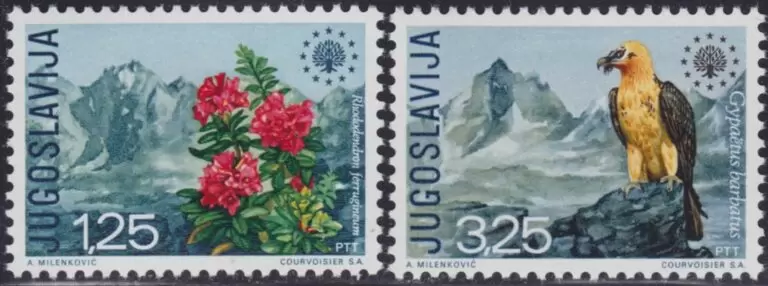Yugoslavia year 1970 Nature conservation year stamps
The concept of a “Nature Conservation Year” typically refers to a designated period of time during which efforts are intensified to raise awareness about environmental conservation, promote sustainable practices, and advocate for the protection of natural ecosystems and biodiversity. While there isn’t a universally recognized Nature Conservation Year, many countries and organizations have implemented similar initiatives to address environmental challenges and promote conservation efforts. Here are some key points about Nature Conservation Years:
- Objectives: The primary objectives of a Nature Conservation Year are to raise public awareness about environmental issues, educate individuals about the importance of conservation, and mobilize collective action to protect and preserve natural habitats and biodiversity.
- Themes: Each Nature Conservation Year may have a specific theme or focus area, such as protecting endangered species, conserving forests and oceans, combating climate change, or promoting sustainable agriculture and land use practices.
- Activities: Nature Conservation Years typically involve a wide range of activities and events, including educational campaigns, community outreach programs, environmental workshops and seminars, tree planting initiatives, clean-up drives, nature walks, and habitat restoration projects.
- Collaboration: Governments, non-governmental organizations (NGOs), conservation groups, schools, businesses, and communities often collaborate to organize and participate in Nature Conservation Year activities. These partnerships help leverage resources, expertise, and public support for conservation efforts.
- Policy Advocacy: Nature Conservation Years may also serve as platforms for advocating for policy changes and legislative measures to strengthen environmental protection, enforce conservation laws, and promote sustainable development practices.
- Global Initiatives: While individual countries may implement their own Nature Conservation Years, there are also global initiatives and campaigns aimed at promoting nature conservation on an international scale. For example, the United Nations’ Decade on Ecosystem Restoration (2021-2030) seeks to galvanize efforts to reverse the degradation of ecosystems and restore biodiversity worldwide.
- Legacy and Impact: Nature Conservation Years aim to leave a lasting legacy by fostering a culture of environmental stewardship, inspiring individuals to take action to protect nature, and achieving tangible conservation outcomes such as the establishment of protected areas, the adoption of sustainable land management practices, and the conservation of threatened species and ecosystems.
Overall, Nature Conservation Years provide valuable opportunities to mobilize society in support of environmental conservation, promote sustainable lifestyles, and safeguard the natural heritage for future generations.










